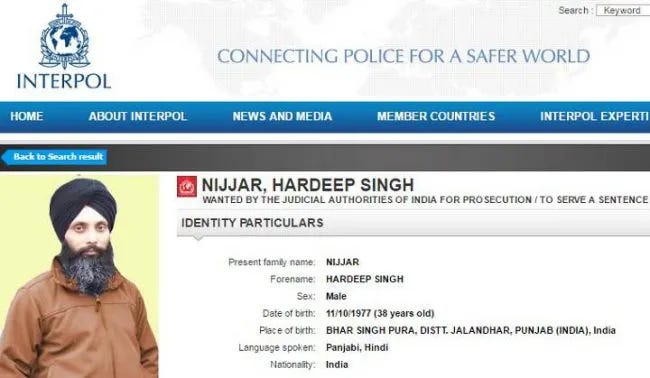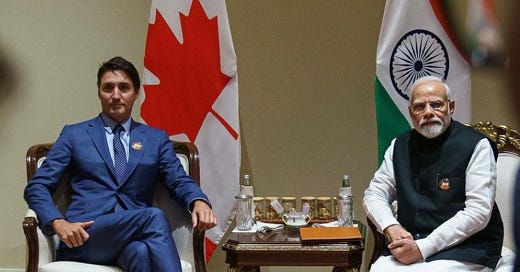
Prime Minister Trudeau’s announcement yesterday that his administration believes “agents of the Indian government” were complicit in the June 18 assassination of Hardeep Singh Nijjar, a Canadian citizen, is a strange and shocking development that will only get stranger once filtered through the many distortions that this country’s Indian diaspora have imposed upon Canadian politics.
Canada’s Indian immigrant population is heavily Sikh, and within the Sikh-Canadian community there is a subculture of Sikh fundamentalists who provide active financial and logistical support to violent separatist groups in India proper — the so-called “Khalistani movement.” Though this group is small, a larger segment of the Sikh-Canadian population is at least sympathetic to Sikh extremists, who are seen as legitimate freedom fighters opposing an Indian government often asserted to be “genocidal.” Many Canadian politicians believe this latter segment of the Sikh population is sizeable enough to be worth pandering to, with one such manifestation being overt, public denials that Sikh fundamentalist terrorism is any sort of problem at all.
In 2019 for instance, the Government of Canada softened an intelligence report whose first draft had explicitly described homegrown Sikh terrorism as a national security concern, after Sikh activists reacted with fury; in 2018 a parliamentary resolution sponsored by the Conservative Party denouncing “Khalistani extremism” was pulled from consideration following similar outrage (for more about this check out this column I wrote for the Washington Post).
This being recent precedent, there will presumably be much political pressure in the ensuing fracas over the Nijjar assassination to avoid portraying Mr. Nijjar as anything but an innocent victim of an unprovoked attack. What Nijjar was or wasn’t getting up to in British Columbia won’t be considered an appropriate topic of conversation, because it will be seen as rationalizing his murder and further traumatizing his “community.”
For its part, the Indian government (if they are indeed complicit in Nijjar’s killing), has now validated the paranoia of the extremist-adjacent portion of the Sikh-Canadian community, who have long believed the Indian state to be surveilling and sabotaging their political movement. Going forward, it will accordingly be even more difficult than it already is for Canadian politicians to not portray Khalistanism as something sympathetic or innocuous — India’s infringement of Canadian sovereignty in this most egregious of ways will remain the “lesser evil” when the topic comes up.
Improving relations with India is a cause that has long enjoyed bipartisan support in Canada, even as white-washing Khalistanism has consolidated its status as a bipartisan cause as well. The Conservatives made a great deal of hay out of Trudeau’s supposedly “disastrous” 2018 trip to the country on the grounds it set back this most important diplomatic objective; a trip last week (darkly conspicuous timing), was aggressively panned as well. The Canadian right hates and fears the Chinese regime and realist conventional wisdom has long posited India as an ally that must be aggressively seduced to counterbalance Beijing.
Conservatives have had to walk a delicate line on this one, however, since to be too pro-India is to be too supportive of the Hindu nationalist Modi government, the great villain of the Khalistani set, who Conservatives are now as eager to pander to as anyone (one hears a lot about the austere and tradition-minded Sikhs being “natural Conservatives”). That balancing act will now presumably collapse to one side. Even among Conservatives indifferent or hostile to Sikh extremism, violating Canadian sovereignty to murder Canadian citizens will be seen as the worse thing; indeed, fixating on whatever security failures allowed it to occur may even offer a fresh line in which to attack Trudeau. This will almost certainly be the course taken by the NDP under Jagmeet Singh, a man who has worked hard to make the previously esoteric matter of the Modi government’s alleged abuse of Sikhs a mainstream cause of the Canadian left.
The Modi government, arrogant at the best of times, surely views this whole situation entirely as an inditement of Canada. The whole reason Indian-Canadian relations are “already shaky” (as the CBC put it), why Trudeau’s trips to the country never go well, is precisely because Modi’s administration views Canada as an unsupervised hothouse of violent separatist traitors. Outside of Canada, I suspect there may be some sympathy for Modi’s position, just because the degree Canada has become bound up in the Khalistani cause will strike many foreigners as deeply weird, and the domestic political reasons for it not particularly impressive. China remains the greater foe to Canada’s allies, meaning the whole episode could wind up being somewhat analogous to the 2018 murder of Jamal Khashoggi, wherein global outrage at Saudi complicity with the murder of an American green card holder was ultimately tempered by desires to stay on the good side of the Saudis in their capacity as a counterbalance to Iranian power.
Canadian foreign policy seems destined to grow more idiosyncratic, and with it, Canada a more marginal player on the global stage.





Punjabi Indian here, and avid viewer of your YT. It is a Canadian issue, not an indian one to the least. Propped up by the Liberal party and NDP. The problem is that this khalistani issue has no support in india. There is only one openly khalistani party in indian punjab which gets about ~2-5% of the vote in punjab (and these 5% are known to be related to drug trade with pakistan). Problem is the fake immigration racket which these khalistanis run which brings in people on the pretext of being "Refugees" and political asylum seakers. Moreover the rampant indoctrination of Sikhs in gurudwaras in Canada.
Great article! It would indeed be very strange if Khalistani Nationalism now became a semi-mainstream progressive cause in Canada, I really hope the NDP doesn’t lean too far into this. It seems leftists are typically willing to accept foreigners with unsavory beliefs into their movement so long as they can frame the group as an underprivileged class. British Labour is the default party for some rather extreme Muslims in London, but also the default party of the Gay community. Whether this is pragmatism or insanity, I cannot tell.